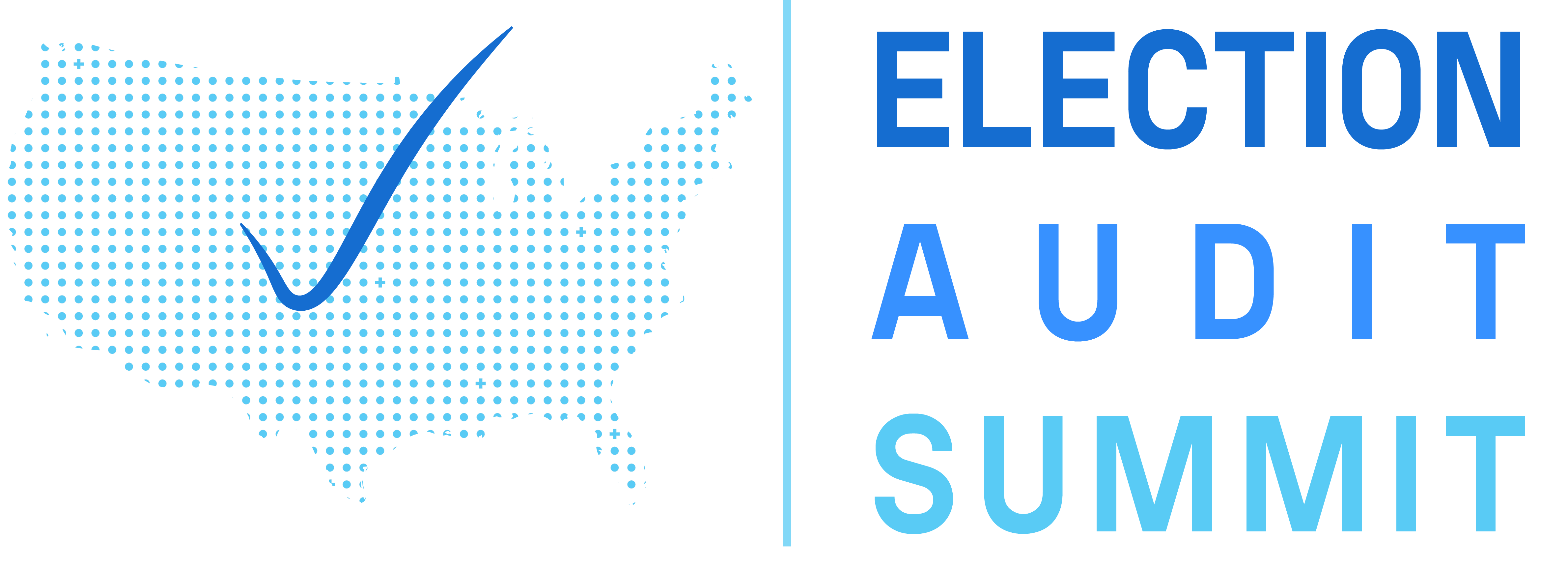Election Audit Summit

Election Audit Summit
Since the 2016 election, concern over the integrity of the computer systems that manage elections in the United States has increased—making it increasingly important to identify and prevent attempts to subvert the effective administration of elections. Now more than ever, it is critical for the scientific and election administration communities to cooperate in developing and implementing strategies for doing so.
The Election Audit Summit provided a space for engineers, social scientists, legal scholars, election officials, and the public to discuss the new strategies that are developing in the field of post-election auditing. Participants explored key issues and perspectives from across the scientific, policy, and legal worlds, contributing to the advancement of our collective knowledge and dialogue.
The Voting Technology Project has released a summary report of the conference, which provides details from nearly all panelists. The report is now available online at the following link:
Watch the Summit
The summit took place December 7-8, 2018 in Cambridge, MA.
Watch the sessions online, and join the continuing conversation on Twitter with the hashtag #ElectionAudits:
Summit Program & Papers
Over two days, the summit featured two dozen contributors, panelists, and discussants from a range of backgrounds in lively conversation on the current status and future directions of election audits. Details about the sessions and the materials provided by panelists are included below. Presentation materials are linked in each panelist's name.
Summit papers and suggested background material will also be linked here as they become available, for your reference.
-
Summit Program
FRIDAY, DECEMBER 7
Morning Session:
8:30 - 9:00am. Breakfast & Participant Registration.
9:00 - 9:15am. Introductions and Welcome. Introduction to the conference, overview of goals and agenda, and conference logistics.
-
Charles Stewart III (MIT)
9:15 - 10:30am. Current status of post-election auditing and recount practices. Panel discussion with academics and practitioners to lay out the intellectual, policy, and legal issues, as they currently stand, in the area of election auditing.
-
Philip Stark (UC Berkeley)
-
R. Michael Alvarez (Caltech)
-
Jennifer Morrell (Democracy Fund)
-
Dylan Lynch (National Conference of State Legislatures)
10:45 - 12:00pm. New statistical approaches to auditing vote tabulation and recounts. Presentations about new auditing perspectives and approaches to assessing election integrity outside the post-election auditing framework.
-
Ronald Rivest (MIT)
-
Walter Mebane (University of Michigan)
-
Emily Beaulieu (University of Kentucky)
- Lunch -
Afternoon Session:
1:15 - 2:30pm. What Colorado Can Teach Us about Post-Election Audits. A panel focusing on the implementation of risk-limiting audits in Colorado, providing perspectives from inside and outside the Secretary of State’s office.
-
Pam Anderson (Colorado County Clerks Association)
-
Hillary Hall (Boulder County Elections)
-
Neal McBurnett (Independent Consultant)
-
Hilary Rudy (Colorado Secretary of State)
2:30 - 3:45pm. Auditing simulation. Led by Professor Philip Stark, this session involved a hands-on simulation intended to provide intuitive insights into the statistical principles that undergird post-election auditing. Instructions for the simulation can be found here.
4:00 - 5:15pm. Looking beyond Colorado: Changing technology and state policy. A panel with two related themes. The first is the role of technology in post-election audits, and the ability of current, or anticipated, technologies to facilitate audits. The second is the issue of moving a state without a history of post-election audits into the world of auditing.
-
Jay Bagga (Ball State University)
-
Jerome Lovato (U.S. Election Assistance Commission)
-
Robert Giles (New Jersey Division of Elections)
-
Mark Lindeman (Verified Voting)
SATURDAY, DECEMBER 8
Morning Session:
8:30 - 9:00am. Breakfast.
9:00 - 10:30am. New directions for comprehensive auditing and forensics. A panel discussing advances in auditing elections beyond election returns, including geography, ballot design, voter registration, and end-to-end verification.
-
Michael McDonald (University of Florida)
-
R. Michael Alvarez (Caltech)
-
Josh Benaloh (Microsoft Research)
-
Whitney Quesenbery (Center for Civic Design)
10:45 - 12:00pm. From here-to-there. This panel, composed of individuals who represent scientific, engineering, legal, and administrative perspective, wrapped up the summit presentations and discussion, and suggested how to plot a course to expand research and implementation in this area.
-
Ben Adida (VotingWorks)
-
Edward Foley (Ohio State University)
-
Matthew Masterson (Department of Homeland Security)
-
William Kresse (Chicago Board of Election Commissioners)
-
-
Further Reading
Election administration audits can play in important role in assuring voters of an election's integrity. What forms do these audits take? How are they conducted—and when? Who runs them? As more and more states adopt some form of election auditing, research and innovation to make them more practical and transparent have also expanded. A selection of this emerging scholarship is included below, for your reference. We have also developed a full list of readings and resources, which can be found here.
Abbreviated List of Resources
0.1 Statistical Models of Post-Election Ballot Auditing
Lindeman, Mark and Philip B. Stark. A Gentle introduction to Risk-limiting Audits. IEEE Security & Privacy 10, no. 5 (2012): 42-49.
Lindeman, Mark, Philip Stark, and Vincent Yates. 2012. BRAVO: Ballot-polling Risk-limiting Audits to Verify Outcomes. Proceedings of the 2012 USENIX/WOTE Conference.
0.2 Websites Supporting Post-Election Audits
Philip Stark. Tools for Comparison Risk-Limiting Election Audits.
Philip Stark. Tools for Ballot-Polling Risk-Limiting Election Audits.
National Conference of State Legislatures. Post-Election Audits.
U.S. Election Assistance Commission. Post Election: Audits and Recounts.
Verified Voting. Post Election Audits.
0.3 Quantitative Studies of Post-Election Ballot Auditing
Alvarez, R. Michael, Lonna Rae Atkeson, and Thad E. Hall, editors. 2012. Confirming Elections: Creating Confidence and Integrity through Election Auditing. New York: Palgrave MacMillan.
Alvarez, R. Michael, Lonna Rae Atkeson, and Thad E. Hall. 2012. Evaluating Elections: A Handbook of Methods and Standards. New York: Cambridge University Press.
0.4 Case Studies of Post-Election Auditing
California Post-Election Audit Standards Working Group. 2007. Report: Evaluation of Audit Sampling Models and Options for Strengthening California's Manual Count.
0.5 Election Forensics
Beber, Bernd, and Alexandra Scacco. 2012. What the Numbers Say: A Digit-Based Test for Election Fraud. Political Analysis 20.2: 211-234.
Wand, Jonathan N., Kenneth W. Shotts, Jasjeet S. Sekhon, Walter R. Mebane, Michael C. Herron, and Henry E. Brady. 2001. The Butterfly Did It: The Aberrant Vote for Buchanan in Palm Beach County, Florida. American Political Science Review 95.4: 793-810.
Looking for more information? See our full list of election audit resources and references on this page.
-
Travel Information
The conference will take place on the MIT campus itself, near the Kendall Square MBTA stop. There are a number of convenient hotels nearby, including the Boston-Cambridge Marriott and the Kendall Hotel.
Please see the final program to confirm the start and ending times for the summit, as well as the exact location of the sessions. Registration will open at 8:30 on the morning of the 7th, and the final session will wrap midday on the 8th.
About the Summit

The Election Audit Summit is an activity of the Caltech/MIT Voting Techology Project, with support from the MIT Election Data and Science Lab.

Organizing Committee
- R. Michael Alvarez (Caltech)
- Jennifer Morrell (Democracy Fund, Election Validation Project)
- Ronald Rivest (MIT)
- Philip Stark (UC Berkeley)
- Charles Stewart III (MIT)